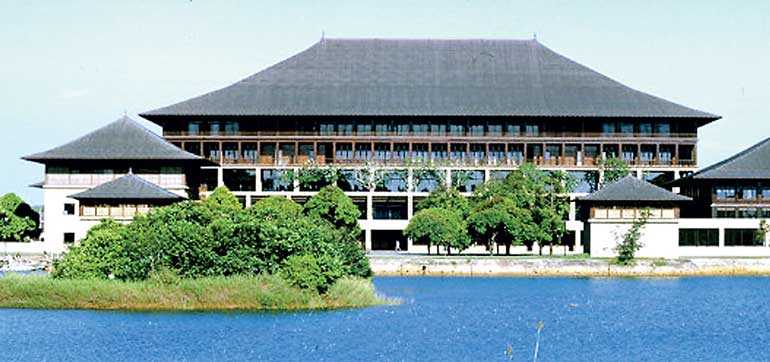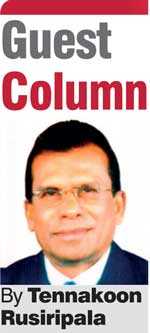Monday Feb 16, 2026
Monday Feb 16, 2026
Thursday, 8 November 2018 00:00 - - {{hitsCtrl.values.hits}}

The Parliament will be able to take all necessary steps to uphold democracy when it is reconvened
The recent decision by the President to appoint a Prime Minister following a changing of the composition of the Cabinet of Ministers and the simultaneous prorogation of the Parliament has caused a mayhem leading to a tense political situation.
Several parties in addition to the parliamentarians representing different segments of the society seem to be seriously involved in this embroil. Latest is the exacerbation of the confusion consequential to the Speaker’s announcement that he was accepting the status quo of the Parliament prior to the appointment of Mahinda Rajapaksa as the new Prime Minister. 
A statement released by the Speaker on 5 November (as reported in the press), contravening a previous statement made by him stating that he would recognise Mahinda Rajapaksa as Prime Minister as his name was gazetted by President Maithripala Sirisena appointing him as the Prime Minister, came as a complete surprise to the country due to its volte-face 180 degrees turnaround from his previous position.
When we examine both these statements in the context of the provisions under the Constitution of the country they appear to be worthless. Because the Constitution provides a prerogative power of appointing a Prime Minister sans any powers of recognition by any one below him. To be more precise, Article 42 in our Constitution (after the 19th Amendment) sub titled, “Prime Minister and the Cabinet of Ministers” in sub section (4) reads as follows;
“The President shall appoint as Prime Minister the Member of Parliament, who in the President’s opinion is most likely to command the confidence of Parliament.”
There are no sub clauses or overriding provisions anywhere else in the Constitution regarding this power. Nor is it stated anywhere that the Speaker has to recognise or approve this appointment. Therefore we are compelled to state with respect that his first position of accepting him as the PM and his second position of refusing to recognise are both redundant. It looks like something confined to an opinion unenforceable.
In so far as the opinion of the President regarding the likelihood of his appointee’s command to win the confidence of the Parliament, it is a matter for the Parliament to prove that it is not so, if it is so! That will have to be done following the laid down Parliamentary procedures. It is not a matter to be pre-empted. Nor should it be left to be decided arbitrarily by any one at his discretion!
Our Constitution is very clear regarding matters where consultation, advice and approvals are required in exercising powers delegated under the Constitution. The Constitution also does not provide for any adoption of practices elsewhere to supplement and undermine clearly stated rights and powers. Therefore trying to challenge an act under the powers of the Constitution is unconstitutional and may be even considered as illegal and punishable.
To the extent of eliminating any doubts or conjectures it is not harmful to make a statement clarifying a position. E.g. The Speaker making an announcement to the effect that the officials in the Parliament are making the necessary arrangements to facilitate the changes necessitated by the Gazette notification is quite in order. But to make a statement which in effect is an overriding of the Presidential powers as given in the Constitution tantamount to a superseding of the Constitutional powers.
The meaning of prorogation in accepted Parliamentary terms is clearly pronounced. Besides how it is to be done under the applicable laws, practices and procedures, there is no ambiguity with regard to its meaning and application under a universal definition;
E.g. Prorogation. Prorogation (pronounced ‘pro-ro-ga-tion’) marks the end of a Parliamentary session. It is the formal name given to the period between the end of a session of Parliament and the State Opening of Parliament that begins the next session.
Motions (including early day motions) lapse when the House becomes prorogued, questions which have not been answered fall, nothing more will happen with them. If they have not been answered then they will stay unanswered. No motions or questions can be tabled during a prorogation.
The question that comes into our mind is how a meeting of the Parliamentarians was held during this period of recession. Isn’t that itself a violation of the accepted norm? In a real sense Parliamentarians are not expected to exercise any acts devolving on their Parliamentary activities. In such a context why did the Speaker summon or permitted to accommodate a meeting of the MPs in the Parliament? The Speaker who appears to be very seriously concerned about the democracy and the good practices has decided to take decisions based on meetings which ultra-vires the Parliamentary practices. In other words the Speaker is attempting to endorse and give effect to such a decision.
Our humble opinion is, Mr. Speaker, it is undemocratic and un-Parliamentary to do so. If a decision taken by the President is unconstitutional and undemocratic as stated in your statement, such action has to be challenged democratically and under the provisions of the law of the country. Not according to the wishes of a group of MPs usurping Parliamentary procedures.
While accepting that you have a right to consider something as your paramount duty according to your conscience, there are several others who would be held directly responsible for the prevention of the destruction of democracy if there is a real threat to such and you are not isolated. We have no doubt that in your limited area of responsibility you have a vital role to play when it comes to the safeguarding of the rights and privileges of not only the majority but even the minority MPs of the Parliament. But what we fail to understand is at this juncture, there is nothing that we can see as any violation of any provision in black and white enshrined in the Constitution of our country.
You seem to have been unnecessarily driven by an urge to step into some areas and make public statements without any written or authentic confirmations. We feel sorry to note that you have even relied on some statements made by Mahinda Rajapaksa at a meeting he reportedly had with some University teachers about the reconvening date of the Parliament. And also to rely on verbal assurances, as you have stated, made by the President in this regard.
Mr. Speaker, what an irresponsible position is that? How can you make statements about a reconvening date of a Parliament which is prorogued by a gazette proclamation of the President? For some unseen reason, you appear to have been in a hurry to intervene and pronounce something beyond your powers.
The Prorogation proclamation according to our Constitutional provisions did include the date the Parliament was to meet. Leaving all the big accusations aside the effect of this prorogation was only about five days because the Parliament before it was prorogued was scheduled to meet only on 5 November. And after 5 November there were only six working days to the date the Parliament was scheduled to meet after the prorogation. When we look back a big commotion has been made over a trivial matter.
In your statement you have chosen hard words which imply that “lawful summoning of the Parliament has been prevented, rights of members have been usurped, in the name of justice and fair play I have to make my stance known to the world”!
Your statement conveys a completely distorted version of the Constitutional provisions of the country. Unlike UK and Canada, which most of the people who have attempted to justify their stand against the prorogation of the Parliament have taken as examples are gross misrepresentations of the facts?
In Canada the prorogation has to be on the advice of the PM by convention. In UK while it is the prerogative of the Crown to prorogue the Parliament, the speaker is informed about the proclamation because is the accepted practice in the absence of a written constitution. What these critics have forgotten of trying to deliberately suppress is that we have a written constitution and it clearly states the procedure for prorogation of the Parliament. And according to that there is no consultation or prior information that is required for the President to prorogue the Parliament. So how can an act done in accordance with the Constitutional provisions are branded as usurpation of the rights of MPSs?
I wish to reiterate that lawful summoning of the Parliament is not prevented but ensured by the President’s proclamation and we all await a ceremonial opening of a new session of our Parliament under a new government a new cabinet and a new prime minister. The new session can take forward all the democratic functions under the sun in that Parliament.
In the context of repeated references to the Western Parliamentary practices professed to be so sanctimonious, let us look at the reality of some prorogations that have taken place there.
Great Britain: In 1997, British Prime Minister John Major avoided the publication of an embarrassing report on a scandal involving bribes being paid to members of his Government by proroguing the Parliament.
Canada: In 1973 Sir John Mc Donald and his Conservative Government were the subject of investigation by a Parliamentary Committee looking into the scandal surrounding the financing of the Canadian Pacific Railway and bribes being taken by various Government Ministers.
In an attempt to thwart the investigations and to avoid a critical vote in the House of Commons, Mc Donald requested that the Governor General prorogue Parliament. The Government obtained a short reprise but was censured after the house was reconvened 10 weeks later.
In 2008 Stephen Harper who formed a minority government had to face opposition due to lapses of the Government. In order to avoid defeat and possible loss of power, Harper resorted to the prorogation of Parliament.
Sri Lanka recent events: On 26 June 2015 the Parliament was dissolved on the insistence of PM Wickremesinghe when a COPE report on the bond scam was to be tabled in the Parliament on the following day.
All these were highly flawed events.
Wickremesinghe was sworn in as a Prime Minister when his party had only 46 MPs out of 225.
The current prorogation is not based on any such. The Parliament will be able to take all necessary steps to uphold democracy when it is reconvened.